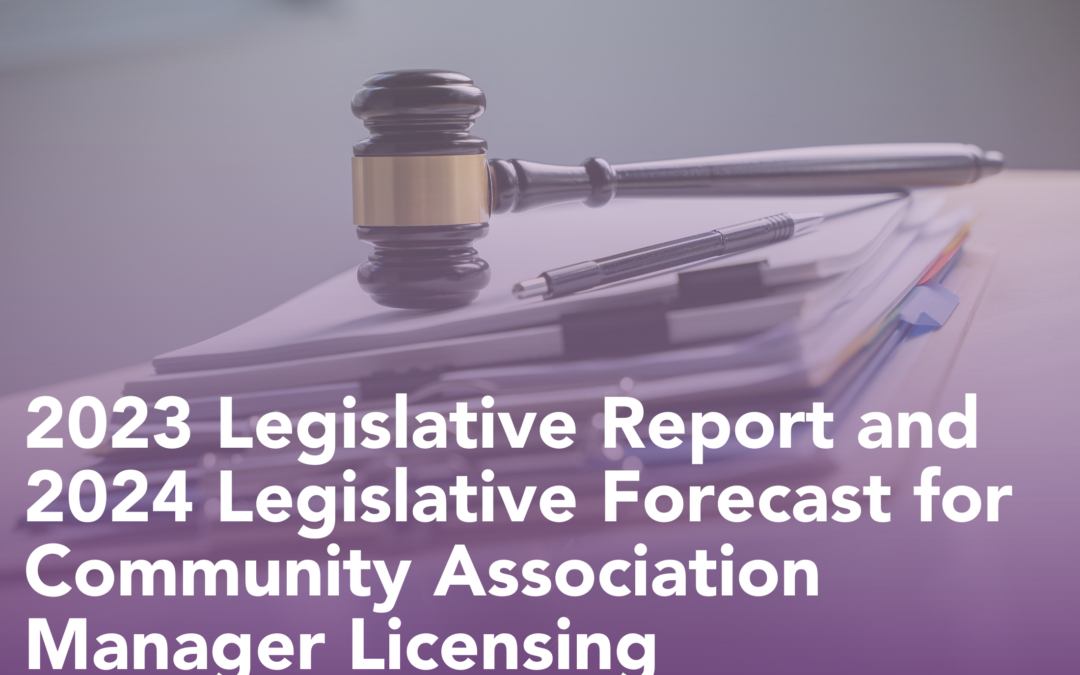Occupational or professional licensing, also called licensure, is a form of government regulation requiring a license to pursue a particular profession for compensation. Government regulation of professions is typically at the state level.
Currently seven states in the U.S. require a license to practice as a community association manager – Alaska, Connecticut, Florida, Georgia, Illinois, Nevada, and Virginia. California has a voluntary licensure program that requires certain standards for private certifications like the CMCA, PCAM, etc.… (of which, CAI meets the requirements). Click here to view each of these states’ regulations.
2023 Legislative Report
Hawaii
HCR 6 – Requests the department of licensing conduct a sunrise review of community association managers. A sunrise review is an analysis and evaluation of the benefits of licensing community association managers. The Hawaii Legislative Action Committee successfully opposed this legislation.
SB 12-03/HB 298 – Requires licensing of community association managers. The Hawaii Legislative Action Committee successfully opposed this legislation.
Status: All three bills failed.
Maryland
HB 80 – Requires licensing of community association managers. The CAI Maryland Legislative Action Committee opposes this legislation because it doesn’t recognize CAMICB or CAI credentials. It creates a financial burden on managers and consumers and is a barrier to enter the profession.
Status: This is a perennial bill that has been introduced for at least 10 years. The measure failed.
Nevada
SB 174 – The bill requires community association managers conducting certain collection practices to become a licensed debt collection agency. Nevada has a manager licensing requirement.
Status: The bill failed.
New York
S 663 – Requires community association managers to be licensed. The CAI New York Legislative Action Committee opposes this legislation because it doesn’t recognize CAMICB or CAI credentials. It creates a financial burden on managers and consumers and is a barrier to entering the profession.
Status: This is perennial bill that hasn’t moved, and we don’t expect it will pass.
Virginia
SB 1480 – Requires an analysis, review, and justification of the community association manager licensing requirements currently in place.
Status: This is the second year this bill was introduced. The measure failed.
What to Watch in 2024
Colorado – Manager licensing was sunset several years ago in Colorado. There was a tremendous amount of negative media regarding foreclosures, transparency, authority, and related issues in the community association housing model. We’re monitoring legislation closely and would not be surprised to see manager licensing.
Hawaii – We expect the perennial manager licensing bills to be introduced. The bills do not typically recognize the CMCA credential. The LAC will monitor closely.
Maryland – We expect the perennial manager licensing bills to be introduced. The bills do not typically recognize the CMCA credential. The LAC will monitor closely.
New York – We expect the perennial manager licensing bills to be introduced. The bills do not typically recognize the CMCA credential. The LAC will monitor closely.
Virginia – Virginia continues to challenge occupational licensing, and we may see another bill introduced that will repeal manager licensing. We do not expect the bill to pass, but we will monitor it closely.
Federal Legislation
H.R. 1477/S. 722 Freedom to Invest in Tomorrow’s Workforce Act. (H.R. 1477) and the Senate (S. 722) This bill allows the use of funds in a qualified tuition program (commonly known as a 529 account) to pay for expenses associated with obtaining or maintaining recognized postsecondary credentials like the CMCA certification.
Status/Outlook: The bill was introduced and is being pushed by the Professional Certification Coalition. CAI has an open call to action on this bill, and our staff has met with members of Congress to express support for the measure. The bill continues to gain support in both the House and the Senate.




It is absolutely ludicrous that property managers are unlicensed in my state. They have fiduciary duties and should be governed and regulated. Corruption is rampant.
that won’t stop corruption.
Why would you believe that an association manager wouldn’t follow rules and state statues and property codes along with any governing documents an association has in place. I am from a state that does not require licensing and I abide by all the rules and almost more than someone that is licensed. The association I work for love me and what I have been able to do for their community within the 4 years I have been here and with only an oilfield background. So you really should not place every manager in your believes. The licensing is something I would like to obtain but finding the time has been a challenge considering the lack of flexibility of a schools schedule for these classes and also continue to do my job as an association manager.
Licensing may add some credibility to our profession, however, all states must recognize the PCAM and or the LSM/ Large Scale Manager designation as part of their licensing qualifications.
Without that recognition, I believe it seriously diminishes our profession and our CAI educational paradigm.
Respectfully,
Dave
Ingrid, I don’t know what state you live in, but I agree wholeheartedly. In states where there is no licensing, there are no rules and no guardrails. And the only folks suffering are the homeowners.
This entire industry needs consistent, universal guidelines. Continuing to allow Associations and their managers to do as they like, is only going to continue to create more physical and financial HOA failures in the future. Our industry will better serve its customers by embracing licensing instead of politically brushing it aside.
I am a PCAM from Virginia, and all of our association managers in this firm have both real estate licenses, and Common Interest Community Manager Licensure, in addition to CMCA, AMS and PCAM designations when they become eligible. The Board exam for the CIC designation was more difficult in my opinion than the real estate board exam. Is it expensive to keep these designations up, yes-but you are managing tens of millions of dollars in assets, it seems like a no-brainer to me, no pun intended.